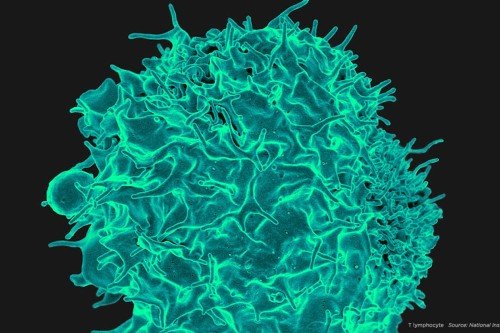While some patients with metastatic melanoma benefit greatly from treatment with an immunotherapy, not all do. Physicians and researchers have been working to understand what can be done to elicit responses to immunotherapy in more patients.
A new study led by medical oncologist James Larkin from the Royal Marsden Hospital in London showed that patients who received two immunotherapies together — ipilimumab (Yervoy) and nivolumab (Opdivo) — had better overall survival compared with patients who received either drug by itself. MSK played a leading role in the development and testing of both drugs, and MSK medical oncologist Jedd Wolchok is also an author on the study. The overall survival data from the phase III study were presented at the 2017 American Association for Cancer Research (AACR) Annual Meeting.
We spoke with Paul Chapman, a medical oncologist in MSK’s Melanoma Service, to learn more and to put the findings into context.
Can you give us a little background about the drugs involved in this study?
Immunotherapies such as ipilimumab, nivolumab, and pembrolizumab (Keytruda) have revolutionized the treatment of metastatic melanoma. Each of these drugs can shrink melanoma and each improves overall survival when used individually. Nivolumab and ipilimumab can be combined and together they can cause tumor shrinkage in 60% to 70% of patients. This is among the highest response rate we’ve seen. However, it comes with a cost: side effects. In our experience at MSK, 90% of patients treated with this combination have a clinically significant side effect, and 72% — almost three out of every four patients — require steroids to treat the side effects. Further, 63% of patients found themselves in an emergency room at least once. So it’s important for us to figure out when we need to use this combination and when it is just as good to use either nivolumab or pembrolizumab alone.
What did this study show?
At the AACR meeting, Dr. Larkin presented the results of a randomized study that MSK participated in. These results will help guide us. In the study, 945 patients with metastatic melanoma were randomly assigned to receive treatment with ipilimumab, nivolumab, or both. This was a worldwide study and early results had shown us that patients getting the combination were more likely to have tumor shrinkage than patients getting either drug alone. However, up until Dr. Larkin’s presentation, we did not know whether this mattered. That is, we did not know if people actually lived longer having had the combination.
The results showed that among patients who got only one drug — either nivolumab or ipilimumab — the patients getting nivolumab had a better chance of being alive after two years. The difference was 59% versus 45%. A difference of only 14%, but a difference that was real.
So we know nivolumab was better than ipilimumab, but what about the patients who got the combination? Did they do better than those getting only nivolumab? At two years, 64% of patients getting the combination were alive. Remember, that’s compared to the 59% getting nivolumab alone — a 5% difference. We can’t yet be sure that this small difference is statistically real, partly because the patients in both groups were doing so well. We may need more time to see how different these groups are.
What can we take away from these results?
From these findings, it appears that for most patients, nivolumab alone is just as good as nivolumab plus ipilimumab. However, it looks like there are some patients who would benefit from the combination. What we have to do now is figure out how to identify those patients.
One way we have is to measure the amount of a protein called PD-L1 on the surface of the melanoma cells by studying pathology slides of the tumor. The preliminary results suggest that patients with a high amount of PD-L1 do just as well with nivolumab alone as they do with the combination.


